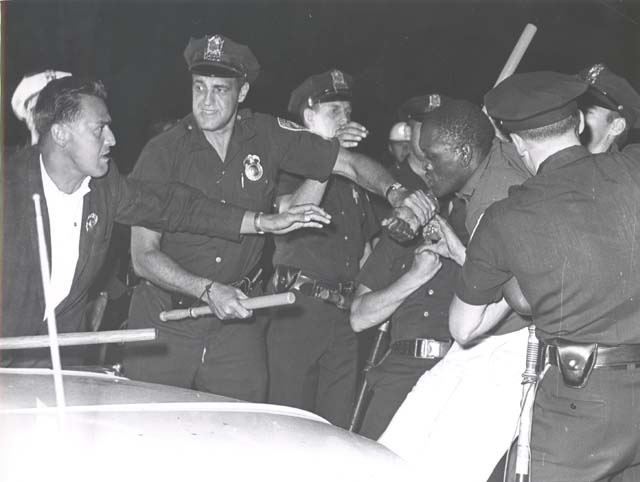July, 1964

The 1960’s was a tumultuous decade for civil rights in America. Protests for the equal treatment of African Americans occurred in cities across the nation, and Rochester was no exception. One such uprising occurred in July, 1964, around the Seventh Ward neighborhood and surrounding communities in Rochester.
The Seventh Ward neighborhood in Rochester was historically a working-class neighborhood. The advent of redlining in the 1930’s deemed the Seventh and Third Wards “hazardous” areas for housing investment, and largely confined Black residents to living within these areas. By the 1960’s, a high concentration of Black citizens lived in these neighborhoods with dilapidated housing and failing infrastructure and had few opportunities for safe and affordable housing. It is this historical context, along with strained relations with the police force due to brutality against Black Americans, that led to the events of July, 1964.
It began on Friday, July 24th, with the arrest of a 19-year-old for public intoxication at a block party near Joseph Avenue. Word started to spread of a child allegedly getting bitten by a police dog, and of a pregnant woman being hit by police. A crowd began to gather, and soon violence broke out. The riots and demonstrations that ensued lasted through the next day. Bricks were thrown, glass was smashed, and a police officer’s car was overturned. Buildings along Joseph and Clinton Avenues were badly damaged. In the early morning hours, a state of emergency was declared. A curfew of 8:00 PM was issued.The National Guard was called in to assist police in containing the riots. That night, the violence and destruction spread to the Third Ward as well. The events ended on July 26th, 1964.
The aftermath of the events left the community devastated. Many businesses were destroyed and looted. Almost a thousand arrests were made, many of which had no priors. A helicopter crashed in the Third Ward after surveying the damage, killing three.
How does the Pythodd fit in?
The events of July, 1964, left the neighborhood devastated, and yet, the popular Pythodd Club was left undamaged. According to former employee Paul Conley, the Pythodd’s standing as a place of community may have spared it. The Pythodd was remembered as a place where community members, regardless of race, could meet to celebrate music. Perhaps consequently, the club was still standing in good condition after the riots. Derrick Lucas, whose Master’s thesis focused on the Pythodd, remarked of the incident, “Not a touch, not a scratch, not even a broken window at the jazz club. That’s how much people appreciated the music.” Others offered similar insights on the strong community surrounding the Pythodd.
Noal Cohen: “From my perspective, it was all about the music… there were black people and there were white people, but the music transcended that, at least on the surface, it did.”
Paul Conley: During the riots, the Pythodd room was, “the one place that wasn’t touched.”
Given the historical context, some have wondered if “riot,” is the correct word to describe these events. As it is the one used by most accounts of the events, this is the term used above in this summary of the events. It is important to consider the implications of calling something a “riot” as opposed to a “protest,” or “rebellion.” While the events of July 1964 were considered riots, they were at heart, protests against systemic injustice.



